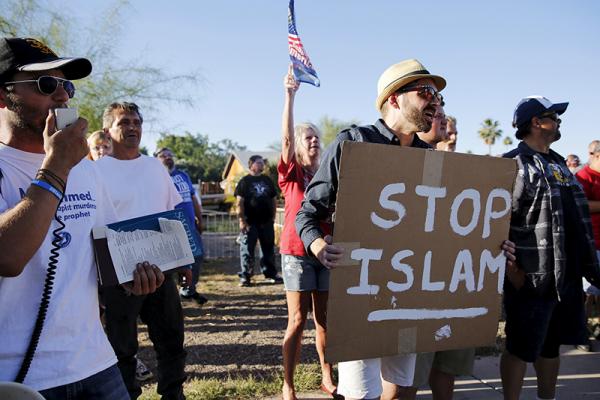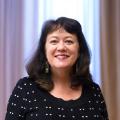This wave of Islamophobia has hit hard.
Anti-Muslim sentiment was never absent from America. From the time Muslims first came as slaves in the 1600s, there have been times when anti-Muslim attitudes have bubbled over.
This is one of those times.
Both statistics and anecdotes attest to an increasingly hostile atmosphere in which American followers of Islam must live, work, and go to school.
Hate crimes against Muslims have surged to their highest levels since 9/11, according to the FBI and civil rights groups. More Muslim women feel vulnerable wearing the hijab . More Muslims fear praying in public. Attacks on mosques have increased, with bomb threats and graffiti.
Many blame President Trump, who ran for office promising a “Muslim ban.”
On March 6, Trump issued a revised executive order restricting travel from six Muslim-majority countries. Civil rights activist and religious leaders say it still targets Muslims.
RNS reporters spoke to three American Muslims about an America that feels less welcoming.
— Lauren Markoe
Nadia Dreid: ‘This is altogether something different’
For Nadia Dreid, the train ride to her internship in Washington, D.C., the morning after Trump’s surprise win in the November presidential election felt more like the time she had spent in Libya than her daily commute.
The usually bustling Union Square station was quiet, said Dreid, a 24-year-old Muslim journalist who now lives in New York. She saw another woman wearing a headscarf who was sobbing.
“Muslims have always dealt with feeling misunderstood, but this is altogether something different,” she said. “‘What is going to happen to us?’ isn’t something I grew up hearing people ask here, but now it is.”
Dreid grew up in Statesboro, Ga., a college town of nearly 30,000 people where she didn’t know many other Muslims and never saw another woman wearing a headscarf. Her father, a Libyan immigrant, didn’t practice his Muslim faith when she was growing up, and her mother is Baptist.
But her faith became something personal and deeply meaningful to her when she was about 13 and decided to wear a hijab. Her father tried to discourage her – this was just a few years after the Sept. 11 terrorist attacks.
“That was when things started to shift,” she said.
Strangers stared openly at her, she said, even pulling their children away from her in the supermarket. Friends she had known her whole life no longer wanted to go to the mall with her.
“You face a lot of people knowing [that] they either know absolutely nothing about you, or the things they think they know are bad,” she said.
“You feel constantly like if you’re having a bad day, you don’t want to show you’re having a bad day because you don’t want to be a grumpy Muslim, or you don’t want [someone] to say, ‘Oh, that Muslim girl was so rude to me,’ because that was the only time someone has met a Muslim.”
Dreid pushed her dad to let her spend time with Muslim family in Libya to learn about Islam from them, though he was wary about letting his 13-year-old daughter travel alone, she said. She later gained dual citizenship in Libya and visited most recently in 2012.
Now she wonders if she’ll be allowed to return.
In Libya, Dreid not only learned about living out her faith, but also about living in a dictatorship.
She remembers photos of Libyan leader Moammar Gadhafi everywhere and being shushed by her aunt when she asked about it. Even sitting in their living room on a farm with nobody within 1,000 feet, she said, her family was scared to say anything above a whisper that could be construed as subversive.
She remembers Gadhafi saying things that were blatantly wrong and easily proved to be false, and his supporters, beyond political differences, unable to agree with others on the same set of facts. It was hard to have a conversation, she said.
“There are too many parallels I’m starting to see here that make me uncomfortable,” she said.
As a young journalist, Dreid said, she feels doubly attacked by Trump and his administration’s portrayal of the media as the “opposition party” and the “enemy of the people.” And she worries that just the fact she is Muslim will lead others to assume a bias in her work.
“The election – I found out a lot of things about people I knew and loved that I didn’t really know. I didn’t know they felt that way about me. They could say it wasn’t about me, but it was. My father is an immigrant. I’m a Muslim. I wear a scarf. I’m not ‘one of the good ones.’ This is just who I am,” she said.
— Emily Miller
Jamal Mezanazi: ‘I feel helpless’
There is a date that is seared inside Jamal Mezanazi’s mind: Aug. 24, 2014.
The day before, Mezanazi’s sister, her children, grandchildren, and daughter-in-law — seven family members in all — boarded a boat from Libya for Italy. It was their last-ditch effort to escape their native Syria for anywhere else.
On Aug. 24, Mezanazi got the call in his Texas home. The terribly overloaded boat had sunk less than a mile from the Libyan coast, and about 200 migrants were lost at sea . Among them were all seven of his family members.
“Too many bodies and not enough help to save them all,” he said, crying softly. He flew to Italy to identify the victims. Not all of them were found.
“I feel helpless,” he said.
Mezanazi, now 58, came to the U.S. from Syria in 1978 as an 18-year-old college student. He became a citizen in 1989, married a Christian, had three children, and opened a food and catering business near Dallas-Fort Worth International Airport.
For most of the 30-plus years he has lived here, he has experienced very little prejudice, very little hate. At first, when people learned he was a Muslim from Syria, they “assumed I was from Saudi Arabia and I had an oil well in the backyard and I parked the camel next to the oil well.”
But in the last year or so, the timbre of the ignorance has changed. Some people look at him as if he were a stranger. “Like I don’t belong,” he said. Now, when he goes to mosque, there are sometimes protesters outside brandishing guns — Texas is an open-carry state.
And people brazenly insult Muslims.
“I just can’t believe the comments I’ve heard and now it’s OK, they think they can say it,” he said. “It is becoming more and more open. No one has the fear. It used to be no one would say it. I guess they were thinking it and now it is coming out.”
Against this backdrop, Mezanazi continues his yearslong campaign to bring his remaining family from Syria and Turkey, where some have relocated. In Syria their homes and business were bombed, their children’s schools closed, their lives upended. But where once their immigration seemed difficult to achieve, it now feels impossible.
“The answer is ‘no’ before anyone looks into the picture,” he said. “I feel helpless. I have so many people [in his family] who need a better life and they did nothing to deserve this. They didn’t carry this gun or that gun, and they need a better life. I feel helpless.”
In an hourlong conversation, Mezanazi expressed sorrow, grief, guilt, regret, frustration, and disbelief, but never anger. He never singled out a politician or even a policy of his adopted country. He never mentioned the name “Trump.” Why?
“Anger towards Americans is nothing. There is nothing they have done to deserve that,” he said. “They are trying to protect this country. The biggest part of what I feel is just sadness.”
And hope. Mezanazi said that no matter what, he will always find hope.
“There is always a bright future coming up,” he said. “We just have to be patient long enough to see it.”
— Kimberly Winston
Nasseer Naji: Pained by refugee cutbacks
Nasseer Naji has a knack for reinvention.
He’s had to do it multiple times over the course of his 57 years. Now he’s teaching refugees his well-worn skills.
Early in his life he was a tank commander for Iraq’s Republican Guard, winning a medal for bravery during the Iran-Iraq War.
Then he took up agriculture and worked on a poultry farm for 15 years.
After the United States invaded Iraq, he attached himself to the U.S. Army and worked for seven years as a material control specialist for a company contracted to provide the military with supplies.
In 2012, he pulled off his most recent reinvention — as an American. He now works as a case manager for Church World Service, helping refugees like himself acclimate to life in the United States.
“I’ve been through this experience,” he said. “I hope to transfer it to other refugees.”
One thing he knows: It isn’t easy.
When new families arrive from Afghanistan or Ethiopia or Somalia or Syria, he presents them with the bad news: Nothing is free. “You’ll have to pay for everything,” he tells them.
And then the good news: You can worship freely. And best of all, “The American people are friendly and willing to help.”
Naji is happy to be living in the United States, where he shares an apartment with his three children, ages 17, 22, and 24. But he’s pained by the president’s new executive order imposing a 120-day freeze on new refugees and more than halving the number of refugees admitted to the U.S., from 110,000 under former President Obama to 50,000 annually.
It took him four years from the time he first applied for refugee status until he was granted his visa to come to the U.S. The vetting process was intense. The Department of Homeland Security grilled him for 90 minutes about his military service alone. They scoured every public document and talked to all his relatives, including his ex-wife’s.
“They ask about everything,” he said.
His heart goes out to the many refugees who have already begun a process they may not be able to complete.
Choosing to leave one’s country is not an easy decision. It means starting from scratch: mastering a new language, often changing one’s occupation, building a new social support system.
“No one will leave their own country without a reason,” Naji said. “You have roots, you have friends, you have memories. It’s hard to leave everything behind and start a new life.”
For Naji, the main impetus was his kids. He worked as a cargo agent at Raleigh-Durham International Airport when he first arrived, scrimping and saving so they could join him two years later.
“I didn’t want my children to be raised in a place where people kill each other, where there are car bombs, where there’s a separate society between Sunnis and Shia,” he said.
But now he worries about his own livelihood. The Durham office of Church World Service resettled 318 refugees last year. Naji is particularly proud of the training he offered his clients. All are settled in homes, working, and studying English.
It’s hard to say how many refugees will come this year, or whether the agency will resort to layoffs.
For Naji, there may be another reinvention yet to come.
— Yonat Shimron
Got something to say about what you're reading? We value your feedback!

